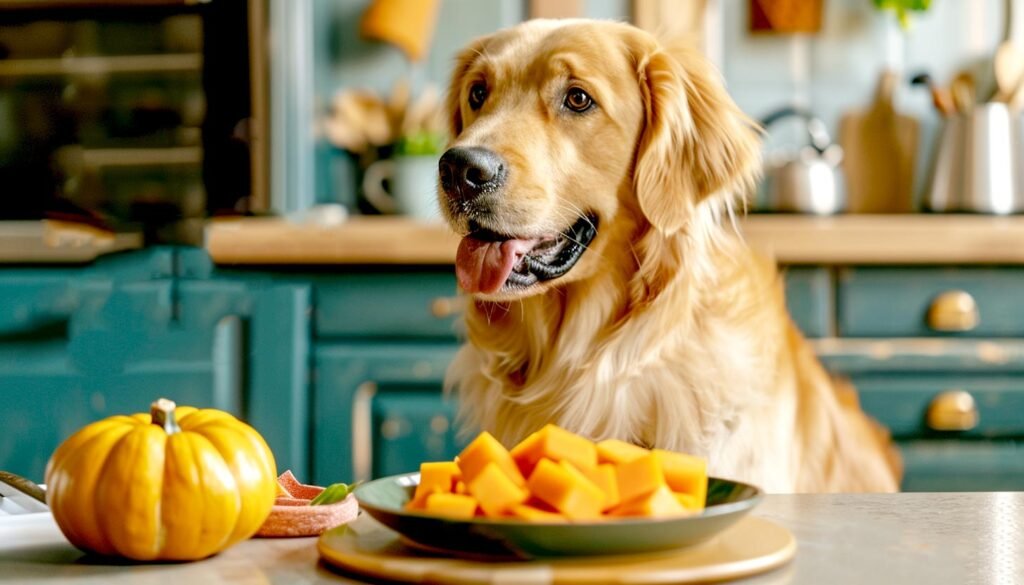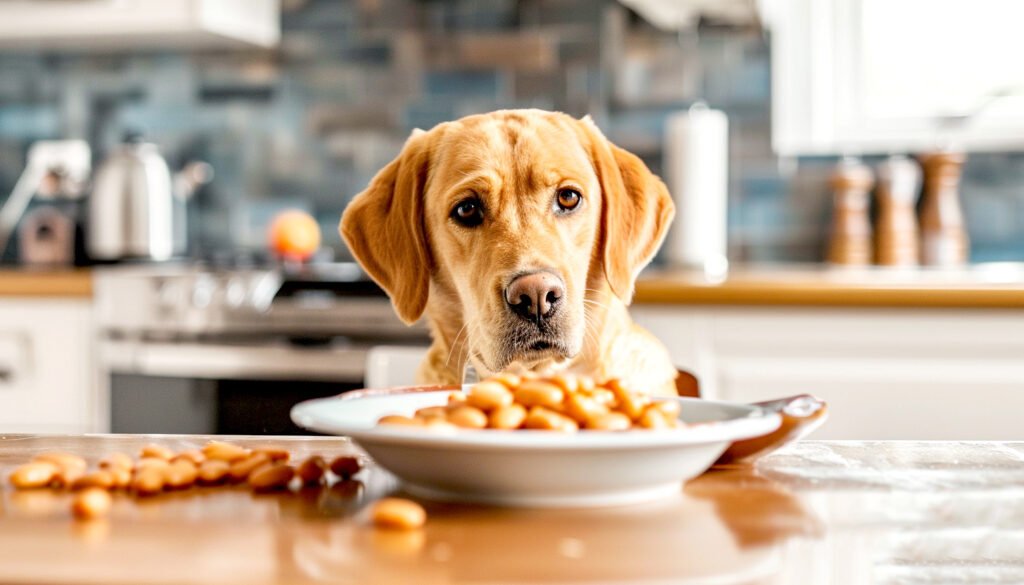As pet parents, we always aim to give our beloved companions the best care possible, ensuring they lead happy, healthy lives. Part of this responsibility involves understanding which foods are safe and beneficial for canines – among them being whether butternut squash provides any nourishment.
As responsible pet owners, it is only natural that we ascertain the intricacies of feeding butternut squash to our canine companions. With its delectable flavor and impressive nutritional profile, butternut squash has long been a mainstay in human diets during fall and winter; but, as conscientious pet owners ourselves, we may wonder whether its nutritious qualities would also benefit four-legged friends.
Through this article, we’ll investigate the nutritional components of butternut squash for dogs, including its potential advantages and risks. In addition, we will gather advice from veterinarians and pet nutritionists so you have a complete picture of this issue.
Contents
What is Butternut Squash?
Butternut squash is a widely revered winter squash variety known for its distinctive elongated shape and vibrant orange hue. It belongs to the gourd family and has a prominent place in kitchens worldwide, especially during autumn and winter seasons. Recognized for its sweet yet nutty flavor and wide array of culinary uses, butternut squash holds a special place in our hearts around the world!
Variety: This variety of squash is known for its smooth, creamy texture and dense flesh, which becomes tender and caramelized when cooked or roasted. Due to its robust flavor profile, this squash variety has become an important addition to soups, stews, casseroles, and even dessert recipes.
Nutritious Package: Butternut squash packs an abundance of essential vitamins, minerals, and antioxidants into its nutritious package. It provides an abundance of beta-carotene which supports vision health, immune function, and skin integrity as well as an abundance of vitamin A for immune function and skin integrity support. Furthermore, butternut squash boasts plenty of vitamin C which promotes collagen production as well as protects immune function against oxidative stress.
Ingredient: Butternut squash is an incredible ingredient to add to our meals and an excellent source of nutrition, providing a range of health benefits. But when sharing it with our furry companions, it’s essential that we act with caution in terms of their individual dietary requirements and preferences. Let’s investigate Can dogs eat butternut squash?

Can Dogs Eat Butternut Squash?
Now that we have explored the nutritional value of butternut squash, let’s address its most pressing question: can dogs eat butternut squash? Although butternut squash is generally considered safe for canine consumption, several factors should be taken into account before adding it to their diet.
Primarily, it is important to slowly introduce new foods into your dog’s diet. Making sudden dietary changes can strain their digestive system and result in serious intestinal discomfort. Begin with small portions of cooked butternut squash and watch carefully for any signs of diarrhea, vomiting, or changes in stool consistency.
However, some dogs may also have allergies or sensitivities to butternut squash. While allergic reactions to squash are relatively rare among canines, it’s still wise to remain alert if your pup has had previous experiences with food sensitivities or allergies. If any signs of itching, redness, or swelling occur upon feeding butternut squash to your pup then stop immediately and consult your veterinarian immediately.
Butternut squash is generally safe for dogs to eat as part of a balanced diet, although you should limit its consumption as part of this daily allowance. Remember that butternut squash should supplement instead of replace regular meals; according to one guideline, 10% or less should comprise its caloric intake daily.
Prior to introducing butternut squash into your dog’s diet, always consult with their veterinarian first. They can offer tailored recommendations based on factors like their age, breed size, and overall health status as well as guidance regarding portion sizes, preparation methods, and any special dietary considerations necessary.
Nutritional Value of Butternut Squash
| Amount Per 100 grams | % Daily Value* | |
| Calories | 45 | |
| Total Fat | 0.1 g | 0% |
| Saturated fat | 0 g | 0% |
| Cholesterol | 0 mg | 0% |
| Sodium | 4 mg | 0% |
| Potassium | 352 mg | 10% |
| Total Carbohydrate | 12 g | 4% |
| Protein | 1 g | 2% |
Butternut Squash’s Nutritional Value Butternut squash is not only delicious; it also boasts impressive nutritional properties that provide important benefits for both humans and dogs alike. Let’s take a closer look at all of the vitamins, minerals, and antioxidants found within this winter squash variety!
Vitamin A: Butternut squash is an exceptional source of beta-carotene, an essential nutrient that plays a pivotal role in maintaining eye and immune system health as well as supporting skin and coat health in dogs. Beta-carotene serves as a precursor for Vitamin A production in our bodies so our furry companions reap all its benefits!
Vitamin C: Butternut squash contains vitamin C, an important nutrient for dog’s immunity and to combat oxidative stress. Furthermore, collagen synthesis requires vitamin C; adding foods rich in this nutrient into your pup’s diet such as butternut squash can contribute to their overall wellbeing and vitality.
Potassium: Butternut squash is an excellent source of potassium, an essential mineral essential to proper fluid balance, nerve function, and muscle contractions in dogs. Adequate intake can support cardiovascular health, regulate blood pressure levels, prevent electrolyte imbalances, and contribute to optimal vitality and vitality for your pup’s overall wellbeing. By including potassium-rich foods like butternut squash in his or her diet you can ensure their wellbeing is maximized and ensure optimal vitality and health!
Dietary Fiber: One of the greatest assets of butternut squash for dogs is its high fiber content, which offers several health advantages. Dietary fiber promotes digestive health by bulking up stool and encouraging regular bowel movements while also aiding weight management by helping to regulate blood sugar levels, promote satiety, and support weight management – so adding fiber-rich foods like butternut squash to their diet will ensure continued digestive wellness as well as overall well-being!
Antioxidants: Butternut squash contains various antioxidants, such as beta-carotene, vitamin C, and other phytonutrients that work to neutralize harmful free radicals and protect cells from damage. Antioxidants play a crucial role in supporting immunity function, reducing inflammation, and preventing chronic diseases in dogs; adding foods rich in antioxidants like butternut squash to their diet will strengthen their natural defenses while prolonging longevity.
Butternut squash is not only delicious, but it is also highly nutritious for our canine companions, providing essential vitamins, minerals, and antioxidants they need for their daily needs. When adding it to their meals, however, it’s essential to take into account portion sizes, preparation methods, and individual dietary needs as well as moderation to maximize the benefits of eating this delectable food. When prepared correctly though, butternut squash can become an invaluable addition that provides essential nutrition essential to their well-being.
Health Benefits of Butternut Squash for Dogs
Butternut squash offers more than just delicious treats for our canine companions; it can also offer many health advantages that will contribute to their wellbeing. Here are a few ways in which incorporating it into their diet could positively influence it:
Digestive Health: Butternut squash’s high fiber content can aid digestive health for dogs by adding bulk to stool and regulating bowel movements. Fiber also serves as a natural laxative, helping prevent constipation while maintaining regularity in their movements. By including high-fiber foods like butternut squash in their diet, you can support their gastrointestinal function and lower the risk of digestive issues.
Immune System Support: Butternut squash contains essential vitamins, minerals, and antioxidants that can strengthen your dog’s immunity. These anti-infection vitamins like A and C play an integral part in fighting infections while simultaneously reducing inflammation. By providing your pup with a diet rich in these vitality-enhancing nutrients you can strengthen natural defenses against illness while safeguarding them.
Weight Management: Butternut squash offers rich flavors and textures while being relatively low in calories and fat, making it an excellent way to help manage weight. With its high fiber content helping your pet feel full without overeating excess calories, replacing calorie-dense treats with nutritional butternut squash treats may help your canine maintain a healthy weight without increasing health risks associated with obesity.
Eye and Skin Health: Butternut squash’s beta-carotene is converted to vitamin A in the body, playing an essential role in maintaining optimal eye and skin health in dogs. Vitamin A helps with low light vision as well as the production of healthy cells and tissues for tissue formation, so by including butternut squash as part of their daily diet, you’re providing them with all of the vital nutrients required to sustain optimal eye and skin health.
Anti-Inflammatory Properties: Butternut squash contains phytonutrients and antioxidants with anti-inflammatory properties that may help reduce inflammation in dogs suffering from arthritis or joint stiffness. By including anti-inflammatory foods like butternut squash in their diet, you can help manage inflammation while improving mobility and comfort levels for both of you.
Risks and Considerations
While butternut squash provides numerous health advantages for dogs, it’s essential that we be aware of potential risks and considerations prior to adding it to their diet. Here are a few things to keep in mind before doing so:
Digestive Upset: While butternut squash provides essential nutrition for dogs, its high fiber content may cause stomach upset in some. To minimize risk, introduce small portions of cooked butternut squash gradually over several feedings while carefully monitoring how your dog responds. If vomiting or diarrhea arises, discontinue feeding it immediately and consult with a veterinarian.
Allergic Reactions: Although allergic reactions to butternut squash in dogs are unlikely, they do occur, particularly among those with food sensitivities or allergies. Symptoms may include itching, redness, swelling, and/or gastrointestinal distress. If your pup exhibits any of these signs after consuming butternut squash, discontinue feeding it immediately and consult your veterinarian immediately for guidance.
Choking Hazard: Butternut squash seeds and tough outer skin pose a significant choking hazard for dogs if not properly removed prior to feeding it to them. Always cook the butternut squash until soft enough for easy mashing before offering it to your canine, making sure any seeds or tough pieces of skin have been eliminated, then supervise their eating activity to reduce choking incidents and ensure safety concerns are minimized.
Weight Gain: Though butternut squash contains relatively few calories and fat, overfeeding it may contribute to weight gain in overweight dogs, particularly if this food source forms part of their balanced diet. Therefore, it’s essential that butternut squash be served only as part of a proper balanced diet aimed at satisfying your dog’s overall caloric intake and activity level. Overeating treats containing butternut squash should also be avoided to maintain optimal body condition in your pet.
Individual Sensitivities: Every dog is an individual and may respond differently to certain foods such as butternut squash. While generally considered safe for most dogs, others may be more reactive due to their fiber content or other components. Make sure that you carefully monitor how your pup reacts and make necessary changes according to his/her needs and preferences.

How to Feed Butternut Squash to Dogs
Proper preparation and serving methods are essential when it comes to feeding butternut squash to your canine companion, ensuring their safety and enjoyment of it. Here is a step-by-step guide on how you can introduce butternut squash into their diet:
Selecting Fresh Butternut Squash: Look for firm butternut squash that’s bright orange in color with smooth skin, and no soft spots, bruises, or mold spots that could indicate spoilage.
Prepare the Squash: Thoroughly wash a butternut squash under running water to rid its skin of dirt or debris, before using a sharp knife to cut both ends off, before cutting it in half lengthwise with another sharp blade.
Extract Seeds and Skins: Use a spoon to scoop out the seeds and fibrous strands from each squash half, followed by using either a vegetable peeler or knife to carefully peel away its tough outer skin. Discard both components as they may be difficult for dogs to digest or pose choking hazards.
Cooking the Squash: Once all seeds and skin have been removed from the squash, cut it into bite-sized pieces for easier cooking methods such as roasting, steaming, boiling, or microwaving. Cook until soft so it can easily mash before offering to your pup as more appealing food to digest.
Serve Squash to Your Dog: Before offering cooked butternut squash as a treat or addition to their regular food, allow it to cool completely before giving it as a reward or treat. Start small by offering small amounts and then continue upping as your pup reacts positively or otherwise.
Storing Leftovers: For quick and convenient leftover butternut squash storage, refrigerate it in an airtight container for three to five days in the refrigerator, or freeze it for longer-term storage – then thaw overnight before giving to your dog!
Monitor Portion Sizes: While adding butternut squash to your dog’s diet can be highly nutritious, it should only make up 10% or less of their total daily caloric intake. Speak to your veterinarian to establish an optimal portion size based on his size, weight, and dietary needs.
Gradual Introduction: If your dog is trying butternut squash for the first time, introduce it gradually to reduce any risk of digestive upset. Start off small and gradually increase portions as your pup adjusts to it.
By following these steps and guidelines, it should be easy to safely incorporate butternut squash into your dog’s diet as an enjoyable treat. As always, be sure to supervise their eating sessions, consult with a veterinarian if there are any queries, and always monitor consumption!
Conclusion: Can Dogs Eat Butternut Squash?
Our research into the safety and benefits of feeding butternut squash to dogs revealed it can be an excellent nutritional addition to their diet when fed responsibly and carefully. Thanks to its rich selection of vitamins, minerals, and antioxidants it offers our canine friends many health advantages – supporting digestion health, immunity function management, weight control management, etc.
While butternut squash is generally safe for dogs to consume, it’s essential to take individual factors such as allergies, sensitivities, and dietary preferences into account before feeding it to them. Introduce butternut squash gradually while removing seeds and tough skin as you monitor their response – this may help minimize digestive upset or other potential issues.
Before making any major dietary adjustments for your dog, always consult with a veterinarian first. They can offer tailored recommendations based on age, breed, size, and overall health status. In addition to advice regarding portion sizes and preparation methods for optimal digestion.
FAQs on Butternut Squash for Dogs
Q: Can my dog eat raw butternut squash?
It’s best to cook butternut squash before feeding it to dogs. Raw squash may be difficult to digest.
Q: Is butternut squash safe for dogs with allergies?
While allergic reactions are rare, monitor for them regularly and consult your veterinarian if you suspect one.
Q: How much butternut squash can I feed my dog?
Feed in moderation, around 10% of their daily calories. Consult your vet for specific portions.
Q: Can I give my dog butternut squash seeds and skin?
No, remove seeds and tough skin before feeding. They can be hard to digest and pose a choking hazard.
Q: What are alternatives to butternut squash with similar benefits?
Yes, options include sweet potatoes, carrots, pumpkin, and green beans. Introduce gradually and monitor for any adverse reactions.
You can also read this post: Can Dogs Eat Baked Beans



